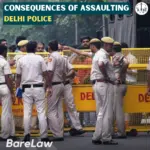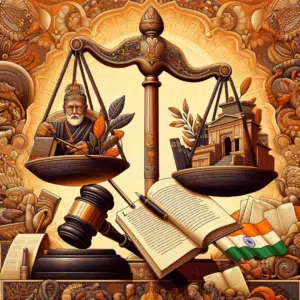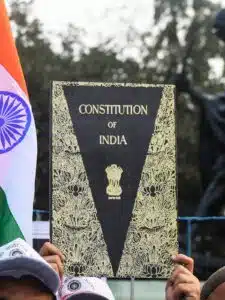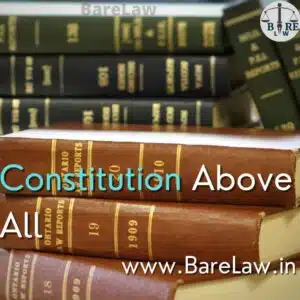
Capital punishment is also known as the death penalty in India. Capital punishment is a hot topic to debate. In India, there are leaders like Mahatama Gandhi, who relied upon non-violence and his famous quote “An eye for an eye will only make the whole world blind.” And “The weak can never forgive. Forgiveness is the attribute of the strong.” Reflects the idea of a state without police. On other hand, the leaders like Subhash Chandra Bose, Chandrashekhar Azad, Bal Ganga Dhar Tilak and more believed in the policy of “To payback in the same coin with interest. These ideas and views from the time of independence are in debate. Eventually, India has accepted the policy of punishing the wrong-doer based on the belief that if the culprit will not be punished for his intended wrong action then as per the human tendency, there is a high probability of him repeating the crime. The provision is accepted to punish the wrongdoer and protect the interest of the interest but the debate is on to give Capital Punishment.
Capital Punishment is a sentence of death given by the Court, it is the punishment that is to be awarded for the most heinous, grievous and detestable crimes against humanity. While the definition and extent of such crimes vary from country to country, state to state, age to age, the implication of capital punishment has always been the death sentence. By common usage in jurisprudence, criminology and penology, the capital sentence means a sentence of death.
The roots of capital punishment can be traced to the law of Draco in ancient Greece. It is well-established fact that each and every country has given capital punishment for the offences at a point in time and practically no country is in the world where the death penalty never existed. In the present time, these countries still have the provisions of the death penalty whereas few countries do not give punishment to the death penalty.
In India, capital punishment can be given in various offences given under the Indian Penal Code, like Section 121, 132, 194, 195A, 302, 305, 307(2), 364A, 376A, 376E and 396. Other offences are given under Section 34, 37 and 38(1) of The Air Force Act, 1950, section 34, 37, 38(1) of The Army Act, 1950, Section 21, 24, 25(1)(a) and 55 of The Assam Rifles Act,2006 and various other provision for the security of the nation and to protect the peace and harmony among the people of the country. Section 354(3) of the Code of Criminal Procedure, 1973 “When the conviction is for an offence punishable with death or, in the alternative, with imprisonment for life or imprisonment for a term of years, the judgment shall state the reasons for the sentence awarded, and, in the case of sentence of death, the special reasons for such sentence.” This section of the code makes a necessary provision to avoid the unreasonableness and arbitrariness of the judge in its court. This mandate the judge to justify the reason for the punishment sentenced to the accused person. This provision makes it clear that the power of the court in giving sentenced to death or the imprisonment of 10years or more, is not absolute. The power has reasonable nexus to give the reason for the same. It must be in accordance with the law and should be to protect the interest of the individual and the nation.
The International Covenant on Civil and Political Rights (‘ICCPR’) is one of the key documents discussing the imposition of the death penalty in international human rights law. The ICCPR does not abolish the use of the death penalty, but Article 6 contains guarantees regarding the right to life and contains important safeguards to be followed by signatories who retain the death penalty. Article 37(a) of the Convention on the Rights of the Child (‘CRC’) explicitly prohibits the use of the death penalty against persons under the age of 18. As of July 2015, 195 countries had ratified the CRC.
The Constitution of India in its chapter III provides certain fundamental rights which also includes the right to live with dignity enshrined in Article 21. It includes life and personal liberty as the fundamental right of the citizen of India. Capital punishment is violative of Article 21 in its meaning but the court held that the rights are given with reasonable restrictions to them and the death penalty is one of the Supreme Court too has upheld the constitutional validity of capital punishment in “rarest of rare” cases.
In Jagmohan Singh vs State of Uttar Pradesh (1973), then in Rajendra Prasad vs State of Uttar Pradesh (1979), and finally in Bachan Singh vs State of Punjab (1980), the Supreme Court affirmed the constitutional validity of the death penalty. It said that if capital punishment is provided in the law and the procedure is a fair, just and reasonable one, the death sentence can be awarded to a convict. This will, however, only be in the “rarest of rare” cases, and the courts should render “special reasons” while sending a person to the gallows.
The Law Commission of India in its 262nd Report (August 2015) recommended that the death penalty be abolished for all crimes other than terrorism-related offences and waging war. The report made certain recommendations like measures suggested that police reforms, witness protection scheme and victim compensation scheme should be taken up expeditiously by the government, that the death penalty is abolished for all crimes other than terrorism-related offences and waging war and sincerely hoped that the movement towards absolute abolition will be swift and irreversible.
The report also mentioned the Right to life and strengthened due process requirements in the interactions between the State and the individual, prevailing standards of constitutional morality and human dignity, the Commission felt that time has come for India to move towards abolition of the death penalty, Although there is no valid penological justification for treating terrorism differently from other crimes, the concern is often raised that abolition of the death penalty for terrorism-related offences and waging war, will affect national security. However, given the concerns raised by the lawmakers, the Commission did not see any reason to wait any longer to take the first step towards abolition of the death penalty for all offences other than terrorism-related offences.
Summing up the debate about Capital Punishment in Legislature, judiciary and International conventions. It can be said that Capital Punishment is the last option to punish the culprit which can only emerge in the rarest of the rare circumstances. The idea of punishment is solely based on the majorly two principles- 1) The innocent should feel safe in the society without the fear of being harm by any other person 2) To make the accused realize his right and responsibilities. Jail is made to give the accused person a healthy and suited routine. And Capital Punishment can only be given when there is absolutely zero chance of improvement in the accused and his survival will be an obstacle in the law and order of the society. Capital Punishment in India should only be given in the cases where the survival of the accused may harm the integrity of the nation or can destroy the peace among the people of the nation.
You may also like to read:
-
05 Jul 2021 OpinionMaratha Reservation: From Legislature of Precedent
-
16 Aug 2021 Know Your LawThe preamble to the Constitution of India
-
11 Sep 2021 Know Your LawSuicide and Mental Health laws
-
09 Sep 2021 Know Your LawCONCEPT OF LEGAL AID IN INDIA
-
12 Sep 2021 Know Your LawConstitution above all








